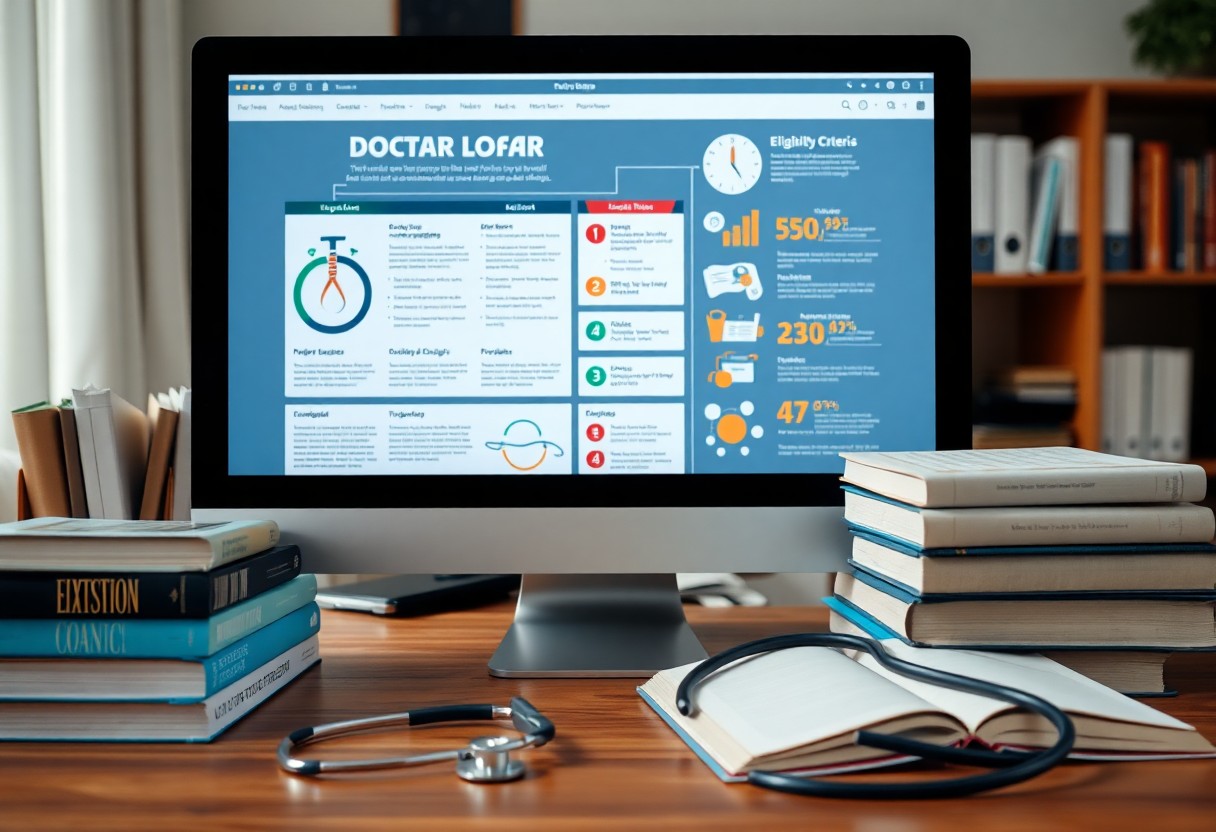Most doctor loan programs are designed specifically for medical professionals like you, offering unique benefits and flexible terms that can help you secure financing for your home. Understanding the eligibility criteria is crucial, as it determines whether you qualify for these advantageous loans. This post will guide you through the specific requirements and factors that influence your eligibility, helping you navigate the path to homeownership with confidence.
Overview of Doctor Loan Programs
Doctor loan programs provide tailored financing solutions specifically for medical professionals, including physicians, dentists, and veterinarians. These programs recognize the unique financial challenges you face, such as high student debt and delayed income, enabling you to secure home financing without the typical barriers that conventional loans impose.
Definition of Doctor Loan Programs
Doctor loan programs are specialized mortgage options designed for doctors and other healthcare professionals. They often feature lenient debt-to-income ratios, reduced down payment requirements, and flexible underwriting standards, making it easier for you to obtain financing for your home.
Benefits of Doctor Loan Programs
Doctor loan programs offer numerous advantages that cater directly to your specific circumstances as a medical professional. These include lower down payment options, no private mortgage insurance (PMI), and the ability to include future income in the loan calculations, allowing you to access home financing more easily.
By choosing a doctor loan program, you may not be required to make a down payment or only need to provide a minimal amount, sometimes as low as 0% to 5%. This flexibility gives you more purchasing power without the burden of PMI, which can save you hundreds of dollars monthly. Furthermore, these programs often account for your potential future earnings as a resident or new attending, enabling you to qualify for larger loan amounts. Such benefits can be especially critical in today’s competitive housing market where waiting to save for a traditional down payment could result in missed opportunities.
Eligibility Criteria
Doctor loan programs are designed specifically for healthcare professionals, providing unique financial options and benefits. To qualify, you typically need to meet certain eligibility criteria, including professional requirements, credit score benchmarks, and financial stability assessments. Understanding these parameters can help you navigate the application process more effectively and secure the funding necessary for your needs.
Professional Requirements
Your professional status plays a significant role in qualifying for a doctor loan. Typically, licensed physicians, dentists, and specialists with a valid degree from accredited institutions are eligible. Residency completion or ongoing training is often acceptable, but lenders may require documentation of your current status and potential income. Some programs specifically target newly graduated professionals, making these loans accessible early in your career.
Credit Score and Financial Stability
A solid credit score is imperative for qualifying for a doctor loan. Lenders often prefer a credit score of 680 or higher, reflecting your reliability in managing debt. Even if your score falls short, some programs are flexible, considering your overall financial stability instead. Having a consistent income stream and minimal debt can enhance your application.
Specific credit score benchmarks vary among lenders, but many doctor loan programs are designed for those in the medical field who may have significant student debt. A score of 720 or above typically secures the best rates and terms. Nonetheless, lenders will also look at your debt-to-income ratio, employment history, and assets. Demonstrating financial responsibility, such as maintaining savings or having a steady job in a high-demand profession, can mitigate lower credit scores and improve your chances of approval.
Types of Medical Professionals Eligible
Various medical professionals qualify for doctor loan programs, ensuring a broad spectrum of individuals can access these unique financial products. These include:
- Physicians
- Surgeons
- Dentists
- Veterinarians
- Pharmacists
Knowing your specific profession can enhance your chances of obtaining favorable loan terms.
| Medical Specialty | Loan Eligibility |
| Physicians | Yes |
| Dentists | Yes |
| Veterinarians | Yes |
| Pharmacists | Yes |
Physicians and Surgeons
Physicians and surgeons dominate the list of eligible professionals for doctor loan programs, offering diverse practice areas, from family medicine to specialized surgical fields. Your income potential and stable employment often strengthen your application, making it easier to secure favorable terms. Lenders typically look for a clear repayment plan, frequently based on your earning trajectory, which tends to be robust in these fields.
Dentists and Other Medical Practitioners
Dentists and various other medical practitioners such as chiropractors and optometrists are also eligible for doctor loan programs. These professions often require significant education and offer competitive salaries, aligning well with lender criteria. The acceptance process acknowledges the financial responsibilities associated with your education, potentially leading to favorable borrowing conditions and lower down payment requirements.
Additional insights reveal that dentists, who may face high student loan debt, are often provided with tailored loan solutions. Lenders recognize the substantial income potential and the increasing need for dental services, ensuring that your financial options remain viable despite initial debt levels. By understanding your industry dynamics, you can better navigate the specific loan offerings available to you.
Income Considerations
Your income plays a vital role in qualifying for a doctor loan program. Lenders typically prefer stable, consistent income sources, primarily from your medical practice, residency, or fellowship. High earning potential often makes you a favorable candidate, especially if you have a clear trajectory towards increased earnings or are employed in a high-demand specialty. Lenders assess not just current income but also your future earning potential based on factors such as specialty and geographic location.
Income Verification Processes
Verification of income involves more than just stating your salary. Lenders usually require recent pay stubs, W-2 forms, and possibly tax returns for self-employed individuals. They may also consider future employment offers or contracts to substantiate your projected income. This thorough vetting ensures that your claimed income aligns with your financial ability to repay the loan.
Debt-to-Income Ratio Requirements
Your debt-to-income (DTI) ratio is a measure lenders use to evaluate your financial risk. For doctor loan programs, a DTI ratio of 40% or lower is generally acceptable. This metric compares your monthly debt obligations to your gross monthly income, helping lenders gauge how much additional debt you can handle without straining your finances.
A DTI ratio exceeding 40% can weaken your mortgage application, even if your income is substantial. Lenders assess both your current loans and potential student debt when calculating this ratio. If you’re balancing significant student loans, you might consider strategies like consolidation or income-driven repayment plans to lower your DTI, enhancing your readiness for a doctor loan. Furthermore, some lenders may offer flexibility; they might exclude certain types of debt from the ratio calculation, increasing your chances of approval.
Importance of Employment Duration
Your employment duration directly influences your eligibility for doctor loan programs. Lenders assess how long you have been in your current position to gauge job stability and predict future income. A longer employment history often translates into better terms on loan options, as it demonstrates reliability and lowers risk for the lender.
Job Stability and its Impact
Job stability reflects your ability to maintain consistent income levels, making it a critical factor in loan approval. In general, lenders favor applicants with at least two years of employment in their specialty or with a reputable institution, as this indicates career commitment and financial predictability. If you’re a recent graduate, lenders may consider your residency or any full-time employment adjacent to your field.
Residency and Fellowship Considerations
During residency or fellowship, your role may be temporary, but it still carries weight in loan applications. Lenders often recognize residency as legitimate employment, allowing you to secure financing even if you’ve only been in the program for a short time. They typically evaluate income from stipends and consider the prospective long-term earnings once you transition to full practice.

Common Misconceptions
Many misconceptions surround doctor loan programs, leading to confusion about who can actually qualify. Some think these loans are reserved solely for physicians with years of experience, while others assume high debt-to-income ratios disqualify them outright. In reality, various factors contribute to eligibility, including educational background and future earning potential, which can afford you more opportunities than you might expect.
Myths Surrounding Eligibility
Common myths persist that only established doctors are eligible for these loans. New graduates or residents often assume they cannot qualify due to limited income. However, lenders recognize the potential future earning power of medical professionals, often allowing you to secure financing even as you begin your career.
Clarification of Loan Terms
Loan terms and conditions can vary significantly among lenders, which can lead to misunderstandings. Some may think that high interest rates are standard for doctor loans, yet many programs offer lower rates to attract medical professionals, reflecting their stable career trajectory and income potential. Additionally, misunderstandings about forgivable loans or down payment requirements can deter you from applying, even when suitable alternatives exist.
Understanding loan terms is imperative for making informed decisions. Doctor loan programs may offer flexible down payment options, low interest rates, and specialized repayment plans tailored to your earnings. For instance, some lenders allow up to 100% financing without private mortgage insurance, addressing concerns about upfront costs. Carefully reviewing lenders’ terms and conditions will empower you to find a loan that’s best suited for your financial situation and career stage, allowing you to focus on your practice rather than financial burdens.
Conclusion
With this in mind, understanding the eligibility criteria for doctor loan programs is important for your financial planning. You will typically qualify based on your professional status, credit score, and income level, all tailored to the unique needs of medical professionals. These programs are designed to support you during your transition into practice, offering benefits such as lower down payments and flexible terms. By familiarizing yourself with these requirements, you can make an informed decision that aligns with your career and financial goals.




